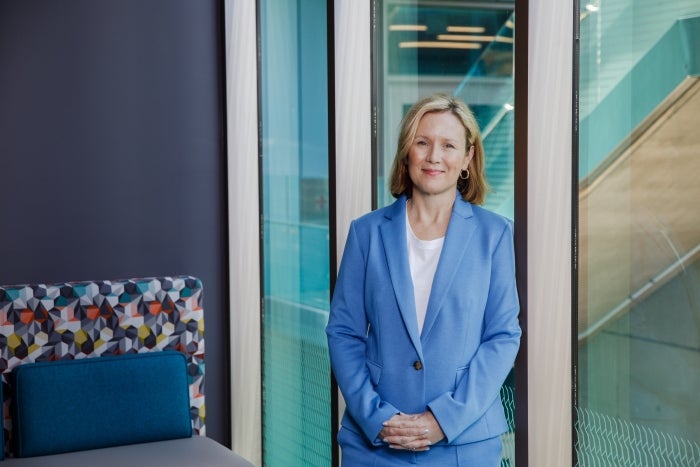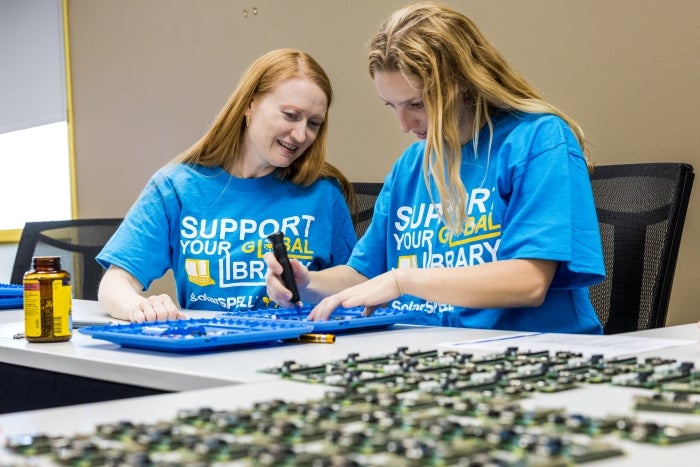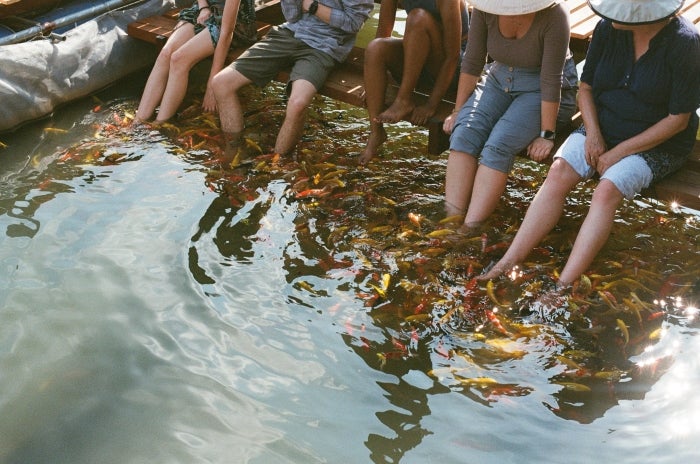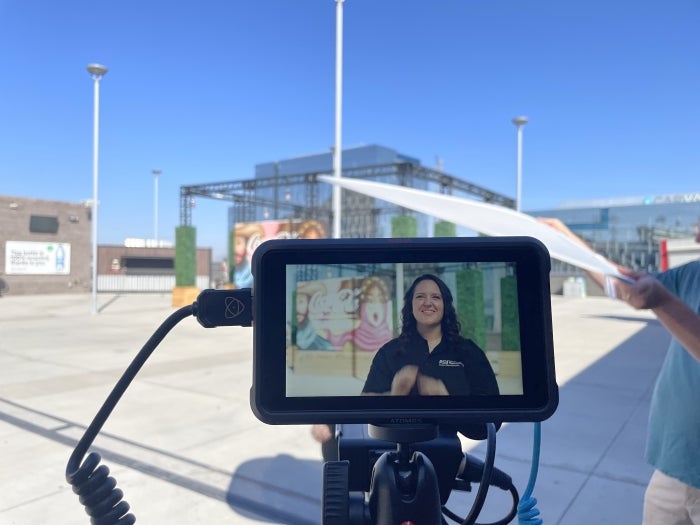ASU offers new project-based courses for global leaders of tomorrow

The College of Global Futures offers a variety of courses, such as SOS 110 sustainable world taught by teaching professor Milan Shrestha, that provide students the knowledge and skills needed to facilitate a thriving future for everyone. Photo by Andy DeLisle/Knowledge Enterprise
Addressing complex challenges requires innovative solutions.
This is why the College of Global Futures — with its four academic units including the School for the Future of Innovation in Society, the School of Sustainability, the School of Complex Adaptive Systems and the School of Ocean Futures — has added new and updated applied learning courses for this upcoming spring 2025 semester.
Building upon courses like GIE: Democracy, Sustainability, and the Global Future of Brazil and futuristic technology like that offered through the Dreamscape Learn CGF 494 course, the college now offers students more options than ever to expand their skill sets and knowledge base through project-based learning opportunities.
“Global Futures is rooted in the conviction that we can and must make a meaningful contribution to ensure a habitable planet and a future in which well-being is attainable for all humankind and Earth’s inhabitants,” said Miki Caul Kittilson, vice dean of the College of Global Futures. “Active learning not only helps students acquire the problem-solving skills that they need to address real-world challenges for futures where all life thrives, it also allows students to make a difference right now, and carry that sense of efficacy in their future careers.”
Arizona State University has been a pioneer in innovation and sustainability within higher education, retaining its No.1 spot for innovation in the U.S. for a decade and ranking in the top 10 globally for its commitment to the United Nations Sustainable Development Goals (SDGs). ASU continues to demonstrate its commitment to educating impactful leaders in building more learning opportunities for students with these brand-new and newly updated courses.
Learn more about the College of Global Future’s project-based courses, including the new course, FIS 494: Topic – Future17: Global Innovation Challenge, coming spring 2025, below.
FIS 494/POS 494: Democratic Innovations Around the World
What it is: FIS 494/POS 494 (HSD 598/IGD 598, for graduate students) offers hands-on frameworks for students to develop proposals for innovations in democratic processes, including electoral systems, citizen participation, referenda, approaches to citizen participation, citizen assemblies and digital innovations.
If you register: FIS 494/POS 494: Democratic Innovations Around the World is offered on the Tempe campus at the Walton Center for Planetary Health during session C (class #35708).
Why it matters: With accelerating and increasingly urgent and complex challenges for representative and electoral democracy on a global scale, how can we reimagine and strengthen democracy and its processes?
This course equips students with the skills to propose, design and communicate democratic innovations effectively.
“Through interdisciplinary approaches, students will learn to address contemporary challenges in democracy and design their own proposed democratic innovation,” said Kittilson, who will be teaching the course.
“After taking the course, students will be able to compare concepts of democracy and different ways it is exercised around the world, and then examine and analyze the effects of some innovative institutions and practices for citizens’ engagement with the democratic process,” Kittilson said.
Future17-related courses — FIS 294: Introduction to Responsible Innovation, FIS 480: Innovation in Society Studio, and FIS 494: Topic – Future17: Global Innovation Challenge
What it is: Future17 was spearheaded by Quacquarelli Symonds (QS) to address the 17 U.N. Sustainable Development Goals (SDGs) and implemented in higher education institutions to bring together young minds to tackle 21st-century challenges. ASU is a founding member and the first U.S. university to participate in collaborating with global institutions.
FIS 294: Introduction to Responsible Innovation and FIS 480: Innovation in Society Studio are parts of the Future17 initiative and are available to all interested students in Tempe and online. The courses enable students to work alongside international peers from colleges around the world through sustainable development work with multinational stakeholders from nongovernmental organizations and corporations for the Future17 Sustainable Development Goals Challenge.
“In my class, we emphasize responsible innovation, principled innovation and sustainable innovation as central approaches, guiding students to develop solutions that are both impactful and ethical,” said Chris Deaton, the instructor of the course who is currently a faculty associate and research coordinator at the School for the Future of Innovation in Society.
If you register: There are three formats of the course: FIS 294: Topic – Introduction to Responsible Innovation (class #30554) for lower division, and FIS 480: Innovation in Society Studio (class #27293) for the upper-division level. For FIS 480, requirements include completion of the prerequisite course FIS 305 and department consent. Lastly, there is the newly created FIS 494: Topic – Future17: Global Innovation Challenge (class #37975). The class is offered at the Interdisciplinary Science and Technology Building 10 (ISTBX) on the Tempe campus.
Why it matters: Through learning about responsible innovation (FIS 294) and experiential learning through practical project management (FIS 480), students gain professional and collaborative problem-solving and design-thinking skills, cultivate a global perspective, enhance cross-cultural communication skills and project management and ethical analysis skills.
“This course equips students with hands-on collaborative problem-solving and design-thinking skills, preparing them to tackle complex, real-world challenges alongside a diverse, international team,” Deaton said.
Students from different disciplines shared that Deaton’s course enabled them to put their knowledge into practice and implement the skills they learned for their future careers.
“The Future17 program provided me with an opportunity to engage with the international community and develop important skills like consulting, project management and leadership; I have built connections with people in Mexico, Britain, Chile and France, and it has been incredible,” said Jadyn Ocampo, who majored in political science and wants to pursue a career in international politics and business. In the course, Ocampo’s team has worked on a B Corp application to advance the SDGs for Join EDuC, a company that provides sustainability accreditations to higher education.
“A valuable insight I’ve learned has been through the INNOVATE framework/model, which encourages us to think beyond immediate impact by considering future effects of our projects,” said Mark Hopkins, who is pursuing an undergraduate degree in graphic information technology and user experience.
“The most challenging yet rewarding experience has been navigating clients’ needs to prevent unforeseen issues, requiring open communication on complex topics — an approach I appreciated in FIS 480 and 499,” said Hopkins, who has implemented this approach in his user experience designs.
SOS/FIS 494 GIE: Vietnam: A Country of Historic Resilience Facing a Future of Rising Seas
What it is: This course is one of the global immersive experiences programs sponsored by the College of Global Futures.
GIE Vietnam explores sustainable development and adaptation strategies of coastal cities against rising sea levels and flooding challenges. Students will get to visit local community development projects that address challenges faced by marginalized communities and participate in service learning activities with local nongovernmental organizations to learn about Vietnamese culture in Ho Chi Minh City and the Mekong Delta.
If you register: This is a three-credit course available to all ASU students who wish to acquire a global perspective and knowledge in preparation for their careers. Applications will be reviewed on a rolling basis upon submission. The program will take place abroad in Vietnam from May 12–24, 2025. Funding options include $500 scholarships available via this form.
Why it matters: “Education abroad gives students a lived experience that cannot be replicated in the classroom,” said Mary Jane Parmentier, deputy director and clinical professor with the School for the Future of Innovation in Society, who spearheads the study abroad initiatives at the College of Global Futures and has led the GIE Vietnam course.
“One of the most staunch takeaways I had from this experience was just realizing how interconnected all of humanity is,” said Levi Sweat, who is a student at the School of Sustainability and participated in last year’s cohort. “I remember feeling incredibly blessed to look around Ho Chi Minh City with this new wonder of being out of the U.S. for the first time in my life.”
Parmentier said that the course is designed to provide culturally immersive and hands-on experiences to learn about sustainability topics, climate resilience and economic society in Vietnam. Last year, the ASU cohort got to run a workshop with Vietnamese students at An Giang University to learn about different SDG priorities in the U.S. and Vietnam.
“One of the most memorable experiences from this trip was visiting an ecotourism fishery in the Mekong Delta in Can Tho to learn about new business models for attracting people to the delta,” Sweat said. The study abroad experience has encouraged him to “push the limits, try things out and be supported by a community of Sun Devils.”
SEA 420: Coral Reef Ecology in Bermuda
What it is: This course is another one of the global immersive experiences sponsored by the College of Global Futures.
Through this program, students spend a summer at the Bermuda Institute of Ocean Sciences, where they interact with corals and reef communities in the ocean, analyze data sets of coral functioning and evaluate the potential impact of different reef management strategies.
If you register: SEA 420 is a three-credit intensive course, which condenses a semester of materials into three weeks and will take place at St. George’s town in Bermuda. The course appeals to students of the School of Ocean Futures and School of Life Sciences with backgrounds in marine science, ecology and oceanography. SCUBA certification is highly recommended, as the course will require boat work and the ability to work comfortably in the water with a mask and snorkeling gear.
Learn more about the course on the Bermuda Institute of Ocean Sciences website.
Why it matters: The BIOS program allows students to connect with students from other global universities while they live onsite in Bermuda broadening their exposure to different perspectives and cultures. The hands-on approach allows students to dive into the water and experience the diversity and interplay of organisms firsthand.
“This allows students to gain an appreciation for the ocean and for coral reefs, understand how scientific research can help to learn about reef functioning and how this knowledge can be used to protect reefs by using conventional and unconventional reef management strategies,” said Yvonne Sawall, assistant professor in the School of Ocean Futures and the course instructor based in Bermuda.
SOS 498: Enterprise-based Sustainability Education
What it is: Enterprise-based Sustainability Education courses SOS 498 (for undergraduate level) and SOS 594 (for graduate level) explore sustainability education's role in addressing environmental challenges by examining how companies implement these practices. Students engage with real-world clients to design relevant curriculums for enterprises, emphasizing teamwork and project management skills to create inclusive sustainability education materials.
If you register: This is a three-credit session B iCourse for undergraduate students of the School of Sustainability. Prerequisites include a minimum of nine hours of School of Sustainability upper-division courses and passing ENG 101, 105 or 107 with a grade of C or better.
Why it matters: “Students will explore how companies build a culture of sustainability and probe real-world challenges of practicing environmental transparency, fostering cultural responsiveness and minimizing greenwashing,” said Janna Goebel, the instructor of the course and an assistant professor of sustainability education at the School of Sustainability.
Swire Coca-Cola is among the course’s larger partners, with around 7,200 employees.
“One of the challenges students face when they enter the workforce is how their coursework transitions to real-world application,” said April Furin, sustainability manager at Swire Coca-Cola. “An enterprise-based sustainability course bridges that gap, equipping students with the tools to identify sustainability opportunities, address challenges and drive meaningful change. Those skills are valuable and will not only help sustainability students find employment after graduation but will help companies, like Swire Coca-Cola, continue their ongoing commitment to sustainability.”
In the spring of 2025, the course will collaborate with ABM Education Services, LLC, the course’s largest partner to date, with more than 100,000 employees, Goebel said.
More Environment and sustainability

Floods linked to rise in US deaths from several major causes
New research, co-authored by Arizona State University Assistant Professor Aaron Flores and published in Nature Medicine, uncovers a concerning link between severe flooding and increased…
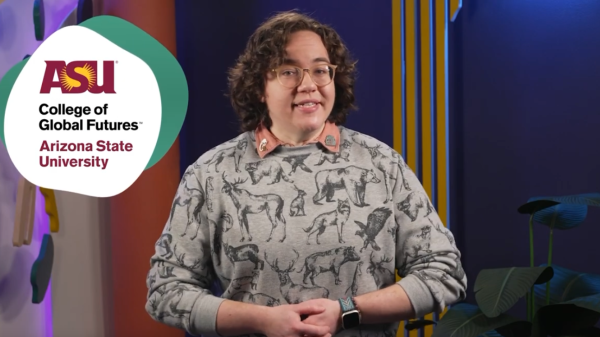
ASU partners with education production company to share research with online learners
Through Arizona State University’s partnership with Complexly education production company, the online educational initiative Study Hall has forged a new pathway for students to earn college credits…

First-year students get immersive cultural, sustainability lessons in Costa Rica
Studying abroad can be a life-changing experience for any student, let alone a new student who just completed their first semester in college.That's what more than 50 Arizona State University…
